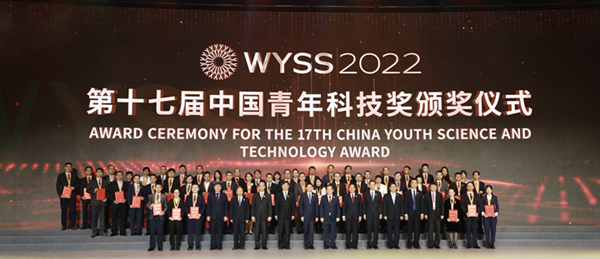Home> News
Six BSC members win 17th China Youth Science and Technology Award
Updated: 2022-11-17
The winners of the 17th China Youth Science and Technology Award were unveiled at the opening ceremony of the World Young Scientist Summit 2022 held in Wenzhou, East China’s Zhejiang province, on Nov 12.

Winners of the 17th China Youth Science and Technology Award are unveiled at the World Young Scientist Summit 2022 in Wenzhou, East China’s Zhejiang province, on Nov 12. [Photo/bsc.org.cn]
Six members of the Biophysical Society of China (BSC) were among the awardees. They are: Wang Xiangxi, He Rongrong, Song Yongfeng, Chai Renjie, Tan Tao and Tan Minjia.
The China Youth Science and Technology Award is handed out every two years, aiming to inspire young academic leaders exploring technical frontiers, and reward young talents who have made outstanding achievements in national economic development, social progress and sci-tech innovation.
Since its establishment in 1987, the honor has been presented to 1,500 young scientists.
Profiles of the awardees
Wang Xiangxi
Deputy director and research fellow of the Key Laboratory of Infection and Immunity at the Institute of Biophysics at the Chinese Academy of Sciences (CAS)
Council member of the BSC
Wang studies the fine three-dimensional structure and related functions of complete virus particles, as well as virus-receptor and virus-antibody supermolecular complexes directly related to major human diseases, using cryo-EM, virology and cell biology techniques. His work reveals the molecular and pathogenic mechanisms of viruses’ invasion of host cells, and antiviral drugs. Wang’s research fields mainly include the replication, assembly and transportation mechanisms of the herpes virus, the molecular mechanism of encephalitis flavivirus’ neurovirulence, and the immune mechanism and vaccine design of ASFV and novel coronavirus.
He Rongrong
Deputy director of the Institute of Traditional Chinese Medicine and Natural Medicine at Jinan University
Director of the Guangdong Provincial Disease Susceptibility and TCM R&D Engineering Technology Research Center
Deputy editor-in-chief of Phytomedicine
Deputy editor-in-chief of Frontiers in Pharmacy
He is mainly engaged in the theoretical basis and pharmacology of traditional Chinese medicine, focusing on the theory of emotion-led disorders and the biomedical basis of disease susceptibility, and innovating and establishing animal models suitable for TCM to evaluate its efficacy.
Song Yongfeng
Professor and deputy chief physician of the Department of Endocrine and Metabolic Diseases at the Provincial Hospital Affiliated to Shandong First Medical University
Song is engaged in the diagnosis and treatment of common and difficult miscellaneous diseases related to the endocrine system, such as diabetes and thyroid diseases.
Chai Renjie
Professor and vice-dean of the School of Life Science and Technology at Southeast University
President of the Hearing, Speech and Communication Studies Academic Subgroup at the BSC
Chai has long been committed to research on the regeneration and protection of inner ear hair cells and auditory neurons. As the discoverer of inner ear stem cells, Chai was the first to regulate the regeneration of functional hair cells from inner ear stem cells through gene therapy in the domestic academic circle. He also pioneered a new comprehensive technical system combining neural stem cell transplantation with artificial cochlear implantation, opening up a novel research field of auditory immunotherapy.
Tan Tao
Professor at the Institute of Primate Transformational Medicine at Kunming University of Science and Technology
Tan focuses on the early embryonic development of primates and explores the development and optimization of in vitro embryo culture technology, the maintenance and withdrawal mechanisms of cell pluripotency and molecular regulation of cell lineage differentiation, the in vitro construction and research of embryonic-like and gastrula-like bodies, and the differentiation mechanism and in vitro differentiation of primordial germ cells and gametes, combining single-cell omics, space omics, biological materials and in vitro embryonic culture technologies.
Tan Minjia
Research fellow and project leader of the Shanghai Institute of Materia Medica at the CAS
Committee member of the Phenomics Academic Subgroup at the BSC
Tan conducts research on protein modification regulation and precise drug intervention based on proteomics technologies. His work reveals the new mechanism of protein post-translational modification in epigenetic and cellular metabolic regulation, as well as the importance and universality of targeted protein modification in the precise treatment of diseases, laying a foundation for research on the mechanisms and new precise treatment strategies of related tumors and metabolic diseases.
